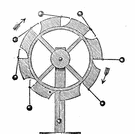An ongoing dialogue on HIV/AIDS, infectious diseases,
September 24th, 2011
Warning: Viral Replication is Hazardous to Your Health
 When studies evaluate the prognostic importance of measuring HIV viral load, they generally do so by assessing a single measurement rather than values obtained longitudinally. One obvious limitation of this approach is that baseline VL poorly predicts outcome after ART initiation — a finding in stark contrast to the original description of VL from the MACS cohort prior to effective HIV therapy.
When studies evaluate the prognostic importance of measuring HIV viral load, they generally do so by assessing a single measurement rather than values obtained longitudinally. One obvious limitation of this approach is that baseline VL poorly predicts outcome after ART initiation — a finding in stark contrast to the original description of VL from the MACS cohort prior to effective HIV therapy.
Now, a collaborative group of researchers report the effect of something they call “viremia copy-years,” a marker of cumulative exposure to viral replication. This “area under the viral load” curve was calculated in 2027 patients starting ART at eight US sites from 2000-2008. Total number of VL measurements was a whopping 21,665.
The results are striking: viremia copy-years strongly predicted all-cause mortality — and did so more powerfully than either cross-sectional VL measurements or CD4-cell count. Each 1-unit increase in log10 copy years/mL was independently associated with a 44% increase in mortality risk.
The take-home message from this skillfully done study is that viral replication is bad for your health — even if your CD4-cell count is OK. And why might this be the case? The authors write:
We speculate the number of viremia copy-years, as a measure of cumulative plasma HIV burden, serves as a surrogate for and perhaps is the underlying driver of cumulative inflammation and immune system activation that approximates such long-term inflammatory biomarker effects.
A few other thoughts:
- Is high viremia copy-years a lab proxy for poor medication adherence? Probably — but this doesn’t invalidate the results.
- Of course in clinical practice, few of us have the calculus skills (remember integrals?) actually to calculate something like an area under the viral load curve. OK, I don’t have the math skills.
- A study evaluating whether pre-ART viremia copy-years influences prognosis would be particularly fascinating — and highly relevant for the when-to-start question.
- The results reinforce the findings from this interesting study linking time of uncontrolled viral replication to an increased risk of lymphoma — paper summarized in Journal Watch AIDS Clinical Care.
So even though we are unlikely to start using this viremia copy-years value in clinical practice, these data certainly make intuitive sense — and reinforce the notion that getting this lethal virus under control is the logical way to improve outcomes.
Categories: Health Care, HIV, Patient Care, Research
Tags: HIV, hiv rna, viral load, viral replication
You can follow any responses to this entry through the RSS 2.0 feed. Both comments and pings are currently closed.
Comments are closed.

Paul E. Sax, MD
Contributing Editor
NEJM Journal Watch
Infectious Diseases
Biography | Disclosures | Summaries
Learn more about HIV and ID Observations.
Follow HIV and ID Observations Posts via Email
- The Mystery of the Isolated Hepatitis B Core Antibody, Solved
- Federal HIV Guidelines Face a Shutdown — A Critical Loss for Clinicians and Patients
- Two Pandemics, Compared: Reflections on HIV and COVID-19
- Why the Sudden Firing of ACIP Members Should Put Every Clinician on High Alert
- How ID Doctors Get Paid, Part 3: The Grab Bag Edition
- ID Cartoon Caption Contest (125)
- ID Cartoon Caption Contest #2 Winner — and a New Contest for the Holidays (92)
- Dear Nation — A Series of Apologies on COVID-19 (80)
- How to Induce Rage in a Doctor (77)
- IDSA’s COVID-19 Treatment Guidelines Highlight Difficulty of “Don’t Just Do Something, Stand There” (74)
-
 NEJM Journal Watch — Recent Infectious Disease Articles
NEJM Journal Watch — Recent Infectious Disease Articles- Is Cardiovascular Risk Sustained After SARS-CoV-2 Infection?
- Which Hepatitis B Vaccine Provides the Longest-Lasting Protection in People with HIV?
- Lenacapavir for HIV Preexposure Prophylaxis: Guidance from the IAS–USA
- Is All-Oral Treatment an Option for Whipple's Disease?
- Two Doses of Recombinant Zoster Vaccine Worked Well in People 50 and Older
-
Tag Cloud
- Abacavir AIDS antibiotics antiretroviral therapy ART atazanavir baseball Brush with Greatness CDC C diff COVID-19 CROI darunavir dolutegravir elvitegravir etravirine FDA HCV hepatitis C HIV HIV cure HIV testing ID fellowship ID Learning Unit Infectious Diseases influenza Link-o-Rama lyme disease MRSA PEP Policy PrEP prevention primary care raltegravir Really Rapid Review resistance Retrovirus Conference rilpivirine sofosbuvir TDF/FTC tenofovir Thanksgiving vaccines zoster
